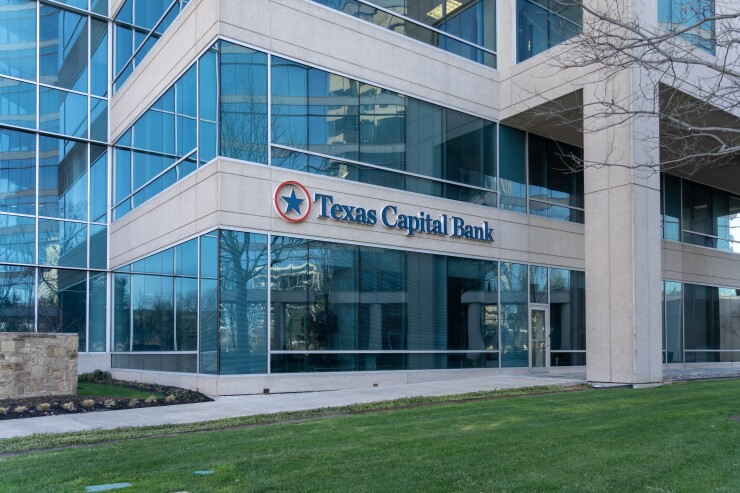
Texas Capital Bancshares' stock price fell more than 8% on Thursday after it posted quarterly profits that missed analysts' expectations, and made negative revisions to its revenue and expense guidance.
The Dallas-headquartered company, which is in
The miss was pegged to lower spread income, which was partially offset by growth in fees. Net interest income for the second quarter fell 6.6% year over year, in part because of higher funding costs, while noninterest income rose about 11% amid growth in investment banking and advisory fees.
Citing a decrease in "client appetite" for loans, Texas Capital is now projecting that its revenue growth for 2024 will be in the low- to mid-single digit percentage range, a downward change from the full-year forecast of mid-single digits that it forecast in January. And the company now expects its noninterest expenses to grow by low- to mid-single digits, versus the low-single digit range it had previously projected, as a result of potentially higher salaries and benefits, as well as higher fee-based compensation.
Texas Capital also pushed its timeline for achieving positive operating leverage from sometime in the second half of this year to the fourth quarter.
"I think the biggest difference halfway through the year, relative to our [revenue] expectations, has really just been client appetite for bank credit," the company's chief financial officer, Matt Scurlock, told analysts during Texas Capital's second-quarter earnings call.
While average loan balances,
A pickup in loan demand is still expected during the back half of this year, but exceeding last year's 8% loan growth is now "a bit more challenging," he said.
Texas Capital's stock price, which was down 8.5% in late-afternoon trading Thursday, is up approximately half a percentage point since the start of the year. The KBW Nasdaq Bank Index, by comparison, is up about 17.1% since early January.
The bank, which had about $30 billion of assets as of June 30, has spent nearly three years transforming itself into what executives say will be "the flagship, full-service financial services firm in Texas." Under CEO Rob Holmes, an ex-JPMorgan Chase executive who
On Thursday, Texas Capital stuck to the
Those goals include a return on average assets of at least 1.10% and a return on average tangible common equity of at least 12.5%. Analysts have voiced skepticism about the company's ability to meet those targets. In the second quarter, Texas Capital's return on average assets was 0.46%, and its return on average tangible common equity was 4.1%.
During Thursday's call, analyst Stephen Scouten of Piper Sandler wanted to know if it's time to "worry" about the goals, given the most recent metrics.
Scurlock said there's "no need to readjust the targets at this point."
"We see a ton of underlying momentum in the business, and the elements required for improved returns are the same elements that we called out in 2021," he said.
For the quarter, Texas Capital reported net income of $37.4 million, a sharp decline from $68.7 million during the same quarter of 2023. The quarter included a $20 million provision for credit losses, up from $7 million in the year-ago period, and $12 million of net charge-offs in connection with what Scurlock described as "a small number of commercial clients and the resolution of a single hospitality loan."
The bank has identified about $40 million of "problem credits," down from $200 million in 2020, while its criticized loans, which totaled $859.7 million, remained flat from the first quarter.
Still, criticized loans were up nearly 39% year over year. Texas Capital has been
When the bank might begin to release some of its reserves for problem loans remains uncertain.
"We need additional clarity on the forward economic outlook or a sustained reduction in criticized loans," Scurlock said.






